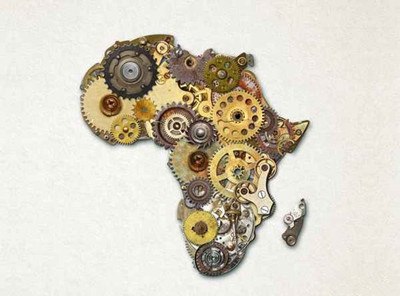Small wonder Africa grew poorer between 1980 and 2000.
难怪在1980至2000年期间,非洲变得更穷了。
Now inflation has largely been tamed, most central banks are islands of excellence and many ministers boast of cutting red tape.
现在,通货膨胀已经得到了极大遏制,大多数央行表现卓越,很多部长级高官都以简化政府流程为夸耀的资本。
Five of the ten fastest reformers in the World Bank’s latest report on the ease of doing business are African.
世界银行最近一次的营商便利度报告中,十个改进速度最快的国家中有五个都在非洲。
Better government has led to better results.
更好的政府带来了更好的发展。
The proportion of Africans living in absolute poverty has fallen from 58% to 41% since 2000.
非洲的赤贫人口占比已从2000年的58%下降至41%,
In that time primary-school enrolment has risen from 60% to 80%. Annual malaria deaths have fallen by more than 60%.
同期的小学入学率从60%升至80%。每年因疟疾致死的人数已经下降了超过60%。
Pessimists fret that much of this progress will reverse now that Africa faces economic headwinds.
持悲观态度的投资者担心非洲经济遇到强劲逆风,大多所取得的进步都会倒退。
There are some worrying signs.
现在也的确有一些令人担忧的征兆。
Leaders once hailed as democrats are amending constitutions to escape term limits.
一些曾被尊为民主主义者的领导人们正在试图修改宪法以突破任期限制。
In Congo, Joseph Kabila’s efforts to cling to power risk restarting a civil war, as the president of neighbouring Burundi already has.
在刚果,约瑟夫?卡比拉(Joseph Kabila)对权力撒手不放,有可能会再次引发内战,邻国布隆迪的总统就是前车之鉴。
The continent’s two biggest economies are making needless and costly policy errors.
非洲两个最大的经济体在政策方面正在犯下不必要且成本高昂的错误。
Nigeria is trying to prop up its overvalued currency by, in effect, banning imports.
尼日利亚实际上在试图通过禁止进口来支撑其估值过高的货币,然而事与愿违,
Instead it is driving up inflation.

South Africa, meanwhile, has prompted capital flight and brought economic growth to a halt by keeping in power a president who was found to have breached the constitution and on whose watch corruption has flourished.
同时,南非因保留了已被发现违宪且纵容腐败的总统,导致资本外逃,经济停滞。
But massive missteps like these are now the exception rather than the rule.
然而这种弥天大错仅仅是例外,并不具有普遍性。
Most countries in Africa are following sound economic policies, controlling government deficits and keeping inflation in check.
非洲大部分国家都在遵循明智的经济发展政策,控制政府赤字,遏制通货膨胀。
Dig beneath the headlines, and even in countries that are making big errors there is momentum for reform:
深挖到新闻头条背后就会发现,即使在犯下大错的国家,仍然有着改革的动力:
in South Africa once-taboo policies such as privatisation are back on the table, and in Nigeria the government is clamping down on corruption and trimming a bloated civil service.
在南非,如私有化等政策不再是禁忌,又重新得以讨论;在尼日利亚,政府正在打击腐败,精简庞大的公务员队伍;
Ethiopia is sucking in foreign investment, and smaller economies such as Ivory Coast and Rwanda are growing rapidly after making it easier to do business.
埃塞俄比亚正在吸收外资;而一些小经济体,如科特迪瓦和卢旺达,在改善营商环境之后增长迅速。













